ten
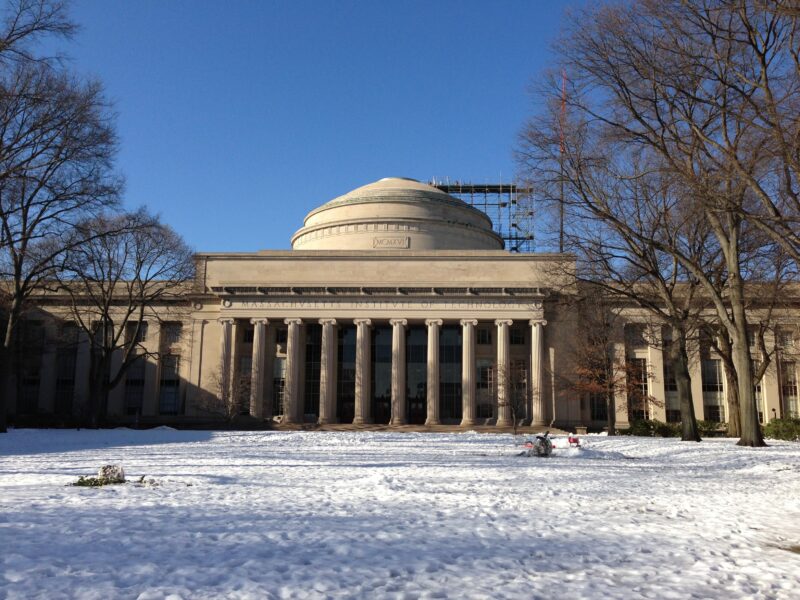
the dome
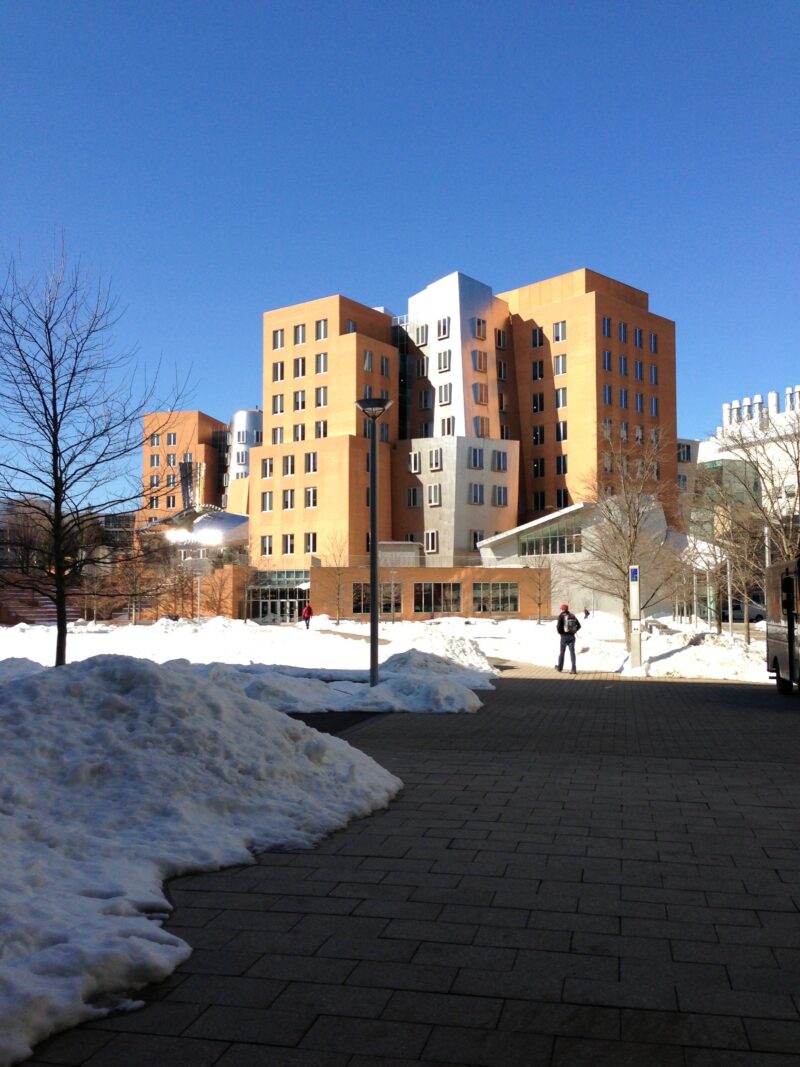
stata
Previous Next
We make fun of the architecture a lot here, but sometimes, MIT really does look nice.
Unfortunately, these are not recent photos. No snow lies on this ground this Valentine’s Day (though of course, love is in the air). These two photos are from Valentine’s Day 2013, during my first time on MIT’s campus — and I’ve spent the past week thinking about how it has been a decade since MIT entered my life.
It’s been a while since I’ve blogged. While I’d like to blog (both on here and not), I haven’t been. Finding time to sit back and reflect and then put it all into words in a way that reflects what I think is difficult. And finding that time (especially when blogging isn’t my “job” anymore), even harder.
Many things in my life are still the same. I’m still a grad student. Still trying to do research on education and finding it hard, and also thinking about what the most important questions in education are to me. I’m still in a cappella. I still really like orange.
But not all is the same. My hair is growing out. I just bought a new bike (also orange). I’m living on campus again, but this time as Graduate Resident Advisor (GRA) in a different dorm. I’ll be leaving my a cappella group this spring, and have written a sappy, sentimental, slightly-dramatic “senior” solo to end my time in the group.
It’s sometimes hard to notice all of the things that are different.
Back in 2013, I was a science fair kid. I’d been doing a long series of projects on the effect of radiation on the growth of plants, and, to cut a long story short, got to attend the AAAS Annual Meeting in Boston that year. MIT, at that point in time, was somewhat of a mythical place. I was only in 8th grade, and while I probably had heard of MIT, I don’t think I knew anything beyond “oh it’s good at science” and “college is a really long way away”. I was there with a hundred or so other science fair people from across the country, and we got to tour around different parts of MIT. (I have a vague memory of visiting the Broad Institute, and some Googling suggests that Dr. Mandana Sassanfar organized it all. Thanks, Mandana!) To be honest, I don’t have any strong memories of my impressions of the place, as it was literally a decade ago; but, I can definitely say that I knew that MIT existed after that trip.
I know that MIT was in my mind at least a little bit, though. Almost all of my messaging in high school happened over Google Hangouts01 which means that I can literally pull up read receipts from conversations. Like this one:
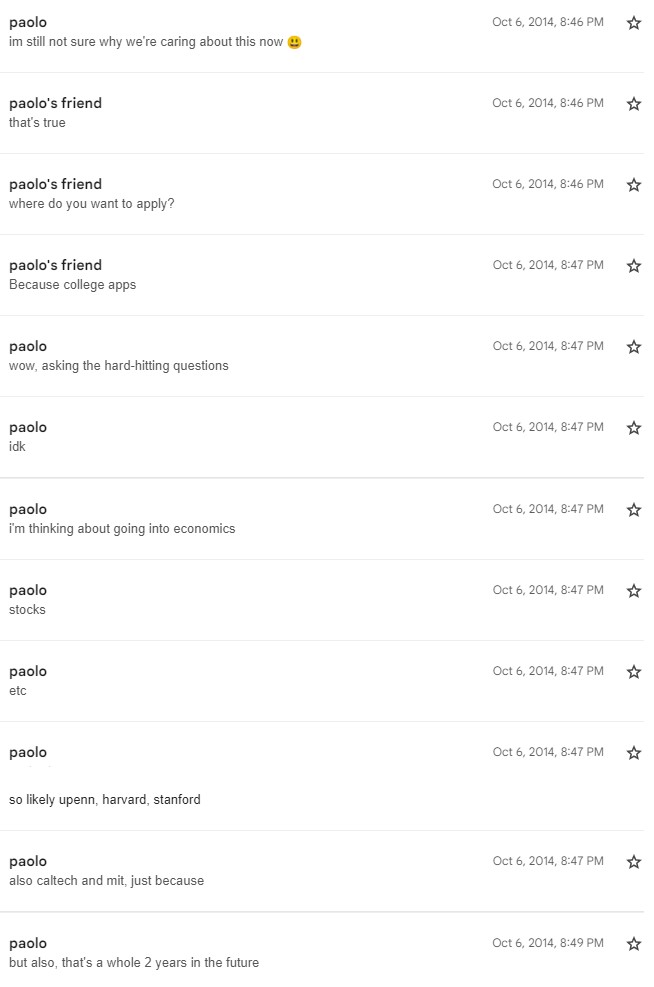
It’s funny to look back and see that economics was on my mind as a potential career option back in 2014. But also, I know I didn’t have a good sense of economics then (particularly, only seeing its relationship to the stock market).02 While I had an answer to my friend’s question, I think the question of “what do I want to do in the future” was only on my mind because of my parents, who really were hoping I had an answer (especially because by then, I’d decided that I didn’t want to do biology/become a doctor, like my older sister). And so any answers I gave here were probably tentative at best.
Reflecting on how MIT has changed me (and as a result, how I view this institution) is hard. There’s the first problem of figuring out exactly how I’ve changed. Then, I need to account for my own “MIT-tinted googles”: for the past 6 years, the longest I’ve been away from Cambridge is just 3 months. Not a lot of time separated, all things considered. Even if I get past that, though, there’s a bigger problem: it’s unfair to credit all of those changes just to MIT.
While yes, these changes did happen at MIT, they also might have happened without MIT. Some of it could be just leaving home for the first time, growing older, or just generally maturing. It could be the people I’ve met — while we were brought together because of MIT, is it really because of MIT that I then had that change, or would it also have happened anywhere else I went?
It’s impossible to reflect and pinpoint the causes of changes with certainty because we’ll never know the counterfactuals. There’s no alternate-universe-self for me to compare to, but such is the nature of life.
Two examples (and these two, I think, are the main things that learned from MIT):
- I feel like I’m capable of doing difficult things. Here, the MIT-centered narrative is clear: MIT is a difficult place. I took difficult classes, spent many late nights psetting, and now, I generally feel like I can do things that are “hard”03 (measured by a variety of ways: intellectually challenging, many hours, competing priorities, …). But would this have happened if I went somewhere else? I’m sure I would have found ways to push myself anywhere else I went, and there’s a decent chance that had I finished college anywhere else, I might have changed in the same way.
- I don’t want to be a person that keeps pushing myself academically. Perhaps because of the fact that I could choose to devote my whole life to academics and economics have I realized that I don’t really want to. I like having other areas of my life — teaching, singing, socializing, and just time for rest and introspection — because my life doesn’t feel good when I am spending all of my time on just “work”. Instead, I like centering my life around people, and valuing the parts of my life that let me connect with others. But perhaps this was just a natural part of leaving high school and growing up and maturing. Whether I’d have discovered this about myself anywhere else — who knows.
I can also point to dozens of other ways in which I’ve changed over the last six years,04 that have even more tenuous connections to MIT as an institution. But it is human nature to try and describe why something happened rather than just being content with observing that it did happen — after all, some believe that storytelling is what makes us human.
Truth be told, I didn’t think a lot about MIT — or college at all — during most of high school.
During my sophomore year, a good friend of mine who was one year older went to MIT for a science research camp, and I remember hearing about how cool he thought MIT was. He got in the next year — but eventually chose to not go. While panicking about what I’d do the summer after my junior year, I applied to a (now non-existent) summer camp at MIT on entrepreneurship. My incredibly cringe-y application was rejected (the correct decision, I think) — but that summer I ended up in Boston anyways, teaching at a small math camp.05 We make a quick pit stop at MIT as part of a field trip, and I remember the feeling of awe at the university — but also trying to figure out where I’d like it here. I talked a lot that summer to my older friend, asking him for the reasons that he ended up going somewhere else instead of MIT. I’ve found one of these chats, and it’s interesting to think about his critiques now that I have been through MIT.
It was that summer I had to start thinking about applying to colleges: doing research about different colleges, reading their websites, and of course, inevitably stumbling on the MIT Blogs. I sent a few links around to friends — my (continued) consideration of economics led me here, this post really started making me feel like a senior. Yet, I didn’t fall in love with MIT, partly because I didn’t let myself — as much as I liked everything I saw about MIT, I didn’t want to get my hopes up about getting in. In hindsight, I wish I did, for to love is to be vulnerable, and hoping for things is part of the joy of life.
But despite believing that I’d be rejected, I got in — and very quickly started absorbing everything about MIT that I could. A livecast with some bloggers let me see the human side of this institution, and how cool the people were. I started reading every blog I could. And I quickly grew so excited about the chance to come to MIT.
To write this section, I went back and looked through dozens and dozens of chats that I had in high school. It’s so interesting going back and re-experiencing the awe of “how in the world did I get in”, the hope that I had for what college could be like, seeing my awkwardness and anxiety and nerdiness of 7 years prior. Most importantly, I got to re-read all of these chats and relive a little bit of the friendships that I had back then; while I’m still close with many of those people, many is not all. That is alright, though, because people change and lives change, and sometimes, people just drift apart. But, to any high school friends who happen to read this — know that I’m incredibly grateful for you, and love you lots <3
During a cappella auditions this past weekend, I mentioned that I was drafting this post; after learning how long I’ve been here, one of the members of our group asked me, almost incredulously, “are you not tired of this place yet?”
It’s a fair question — I’ve been here for literally a quarter of my life, and by the time that I leave, it’ll be the longest I’ve ever stayed in one place. At this point, I know Cambridge and Boston in and out. I can navigate almost anywhere without needing to stop and check directions on the way. I have been to almost every single restaurant within a mile of MIT. And while there’s much more to explore (down in Boston, out to any of the suburbs), I have seen a lot of it.
Exploring Cambridge and Boston didn’t really start until graduate school; I didn’t leave campus too much during my first few years, and only when I started living off-campus did I start feeling more connected to the town as a whole. I still don’t think I have that much connection to it, but at this point, it feels stronger than my ties to Nevada.
I’ve witnessed a lot of change at MIT. New buildings are always being made. There’s a new president. There are new people; in my time at MIT, I’ve been around people from the Class of 2018 to the Class of 2026, and by the time I leave, the incoming first-years will be the Class of 2031.
Perhaps part of the reason MIT itself doesn’t feel old yet is that I’ve kept having new experiences with new people: new roommates my freshman year, new people in every club I joined, becoming a part of the economics graduate student community, and more. But at this point in my life, especially with so few friends from college still in the area, I feel like my social life has stagnated a little, and that I might start feeling a bit more tired of MIT in the next few years.
So, after all of this time, how do I view MIT now?
- For me, what made MIT special was the people. As an undergrad, meeting amazing people who kept challenging the ways I think, inspiring me to be more, or helping me to better person. As a graduate student, being a part of a cohort that supports each other through the long journey of research, and also getting to watch current undergrads learn to appreciate the same things I did. But how much of that is MIT? Or is it just me choosing to be a part of communities that had these kinds of people, and this would have happened anywhere? Who knows.
- In education more broadly, I think that too much public consciousness goes toward places like MIT (and other elite colleges). While they are important, they are not overly so. MIT has 4000 undergraduates; 16 million people in the United States go to college right now, over half of them at colleges accepting over two-thirds of applicants.
- I came to MIT partially because of wanting to feel challenged. It did that for me, and I am glad. I grew a lot here, in many ways. At the same time, I wonder if MIT needs to be as hard as it is.
- I deeply appreciated the amount of self-governance that undergrads received: the ability to make choices about how their living group operated, the input we got to give into larger policy decisions, the freedom to crazy events (2000 students on campus?!), and more. This autonomy has led to wonderful amounts of creativity and quirkiness that make MIT unique, and it feels like some in the MIT administration don’t understand how valuable that culture is. (See here and here for other relevant reading.)
- There is a lot to be said about the amount of resources that MIT has — classes, professors, research opportunities, funding for fun projects, massive career fairs — but I’m pretty sure it’s all been said already. Anything I say on it has no use.
- As a tour guide, I often said that “everyone at MIT is passionate about something;06 they do what they love and love what they do”, and I knew that every conversation with someone here would lead somewhere interesting or inspire me in some way. Everyone here has something that makes them tick, and it’s always exciting to find that…
- …but now that it’s been a few years, I also see that this has a drawback; namely it leads to some amount of homogeneity07 . Everyone here has some passion, and when I was constantly surrounded by people I was excited to hang out with, I found it easy to forget to interact with the world beyond MIT (contributing to the unfortunate fact that MIT can feel like a “bubble”). Only in the last few years do I feel like I’ve gotten better at this, largely driven by actually living off campus.
- MIT is incredibly collaborative (and not competitive); people tend to learn quickly that the only way to make it through here is by working with and supporting each other. But because at MIT, you’re constantly surrounded by such smart people doing such cool things, it’s easy to feel like you always have to be doing something productive, and it means that it can feel bad to just do things for yourself. It’s not easy to let go of this feeling. (I think I’m much better at it now than I was, say, four years ago, but it’s still hard.)
I’m aware that none of these are new observations. They’ve been said time and time again by many who have come before me, and many more will figure out similar things in their own time. But it’s different to live through it all and see first-hand how they have been (and are) in my own experience at this institution.
I do deeply love MIT. It has been wonderful to me, and I’m so lucky to be here. I have never regretted coming here, and if I had to go back, I’d happily choose MIT again.
At the same time, it’s important to remember that MIT is just another place. A very special place with so much to offer; but also, the parts of MIT that really make it special can be found everywhere. MIT is not perfect; but also, no place is.
It’s been ten years since I first stepped foot on MIT’s campus. By the time I leave here (presuming I graduate when I think I will), I’ll have been here for ten years. A decade. Over a third of my life.
I’ll be here for four more years. I’m thinking of all of the ways that I changed in high school and undergrad — both four-year periods — and realizing that I have that amount of time left here in Cambridge. What kind of person will I be, come 2027? How will I change (either because of, or in spite of, MIT)? How will MIT change?
I guess we’ll see.
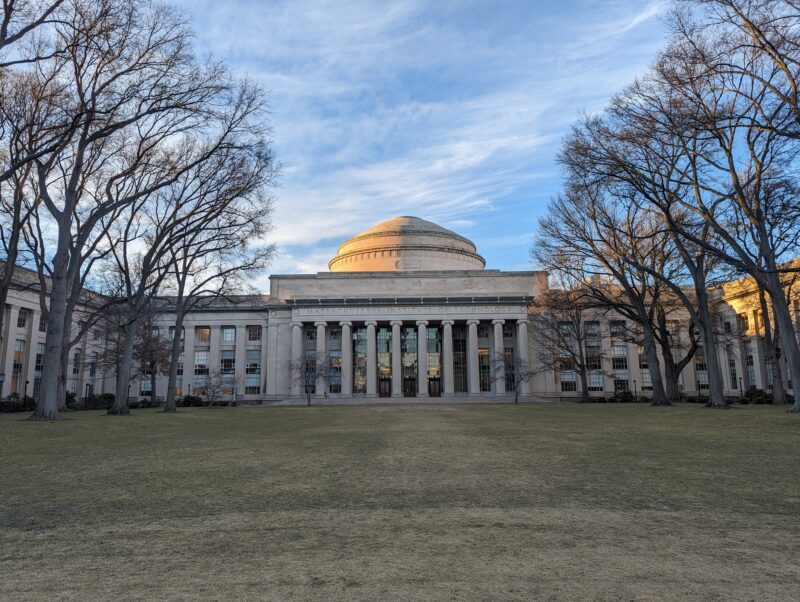
the dome, 2/14/23
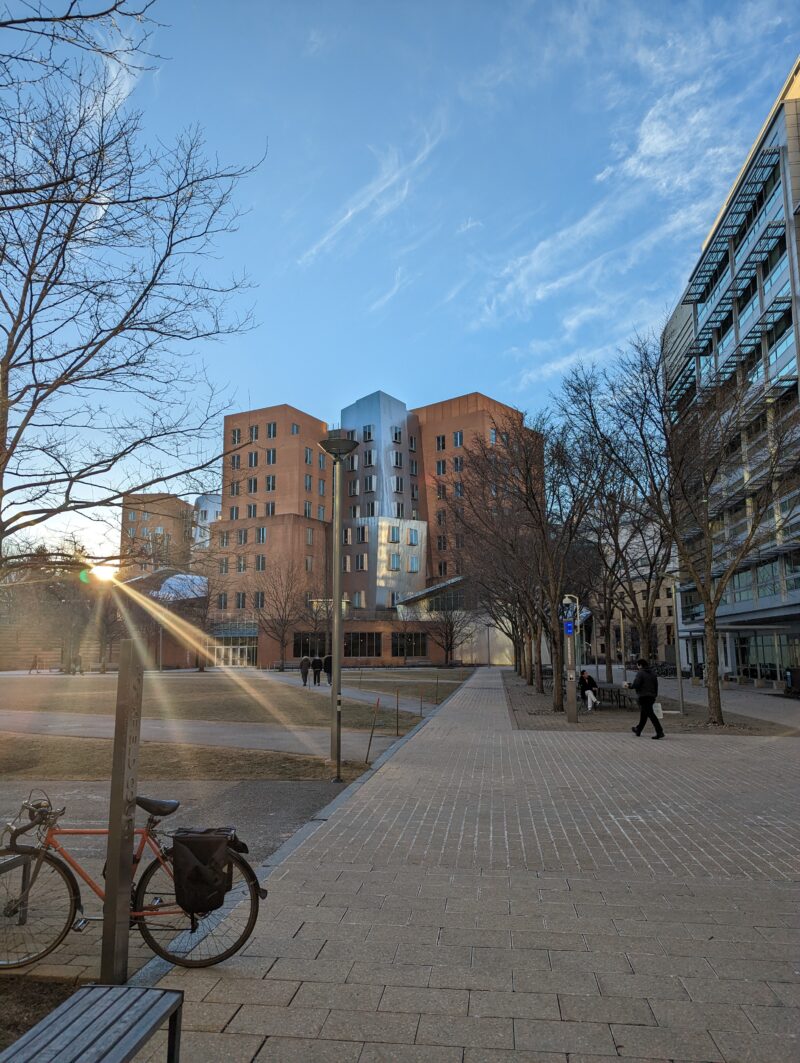
stata, 2/14/23
Previous Next
IHTFP.

Comments